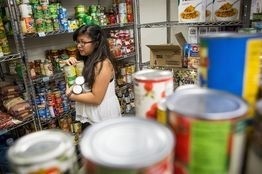Replenish Food Resource expands, fights food insecurity

Courtesy / GVSU
Jan 7, 2019
According to Students Against Hunger, 20 percent of students at four-year colleges qualify as food insecure. Grand Valley State University is taking the initiative to exclude itself from this devastating statistic.
Replenish Food Resource, GVSU’s food pantry and resource for students, is expanding to the downtown Grand Rapids Pew Campus. In addition to the location in the Kirkhof Center on the Allendale Campus, Replenish will now be located in the Cook-DeVos Center of Health Sciences on the Health Campus. The Gayle R. Davis Center for Women and Gender Equity, Office of the Vice Provost for Health and the Student Nurses Association have partnered together to make this expansion possible and to fight hunger among college students.
Food insecurity can be a source of major stress for students, and inadequate nutrition often decreases academic performance. Replenish is for all students who face financial struggles that compromise their access to food. Along with the perishable and non-perishable food products available, personal care items such as hygiene products and laundry detergent are also provided. Since the inception of Replenish in 2009, more than 1,000 GVSU students have been assisted by the pantry.
“Both the Allendale and (Pew) Campus sites were created to support students that identify as food insecure or are unable to purchase food due to lack of finances,” said Associate Director of the GVSU Center for Women and Gender Equity Sharalle Arnold.
“Access to food is a necessary ingredient for college success and engagement. Food is widely available across campus, but it is not accessible or affordable for many GVSU students. Food insecurity and homelessness are very real concerns that are not as widely discussed in higher education.”
While Replenish has undoubtedly been benefiting students throughout the years, it only meets short-term challenges for many. To see major results in a decrease in hunger on campus, there must be an institutional change.
“While I am happy to host a secondary site to support students, I don’t get caught up in the celebration of it all,” Arnold said. “I want us to acknowledge that a secondary space gives us the opportunity to feed and support more hungry students, but that is simply a topical approach. I am eager to see some institutional change that addresses the systems that keep our students hungry rather than focusing on the hungry students. We have food waste on campus. We have food that is priced at a very unfriendly price point for some students, and financial aid is limited in what it can do.”
To expedite these necessary changes, students must take action. There are a number of steps that students can take to make a difference on campus for their fellow Lakers.
“Participate in a food justice presentation,” Arnold said. “Take a stand against the broken food regime. Fight to reduce the one-in-four that goes hungry. Get involved with student senate. Support their new resolution to inspire reduced prices for food. Offer all unused debit dollars to Replenish. Offer unused meals to Lakers that might not have a meal plan.”
An open house for the new downtown Replenish location will be held on Thursday, Jan. 10 from 1 to 3 p.m. in room 340 of the Center for Health Sciences building. Guests are encouraged to bring an item to donate.
“Replenish is just the beginning,” Arnold said. “Hunger doesn’t end with the opening or expansion of a food resource. Campus hunger, and hunger in general, ends when people in need become a priority.”






















